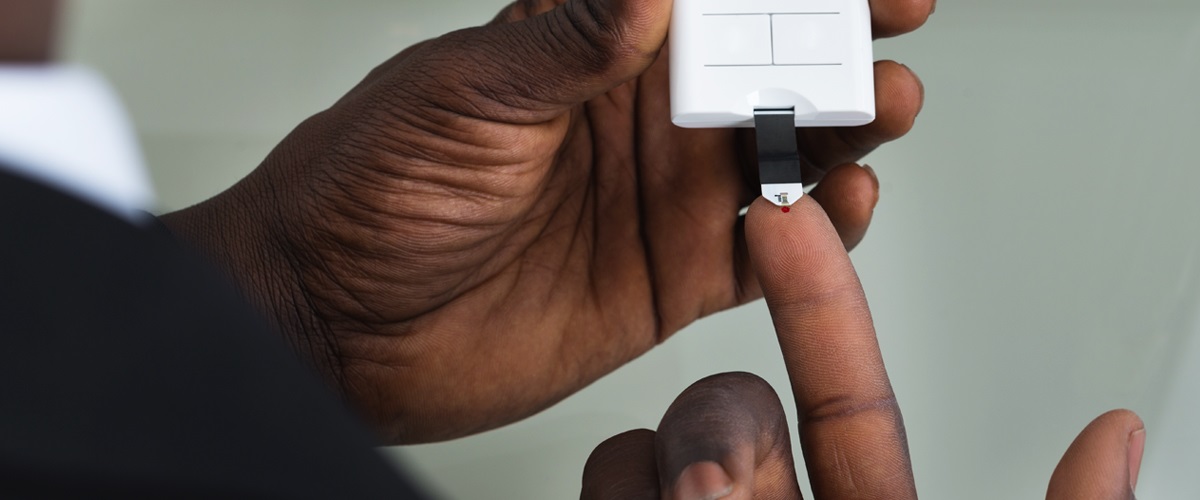Managing Diabetes During the COVID-19 Outbreak
An endocrinologist explains why people with diabetes are at increased risk for serious illness if they contract COVID-19, and what they should do to reduce the threat.


COVID-19 can strike anyone. But it is increasingly clear that people with conditions like diabetes are at greater-than-average risk for serious illness or death if they contract COVID-19, the disease caused by the coronavirus.
“The available data suggests that people with diabetes are at a higher risk for complications from COVID-19,” says Dr. Jacqueline Y. Lonier, adult endocrinologist at the Naomi Berrie Diabetes Center at NewYork-Presbyterian/Columbia University Irving Medical Center. “This could be due to the effects of high blood glucose levels, but it could also be related to age and to other common comorbidities like hypertension, heart disease, or obesity.”
Among 5,700 people hospitalized with COVID-19 in the New York region, nearly a third had diabetes, according to a new report in the Journal of the American Medical Association.
Uncontrolled diabetes has been associated with increased risk of respiratory failure due to COVID-19, Dr. Lonier says. Patients with diabetes who contract COVID-19 are also are at a greater risk for diabetic ketoacidosis (DKA), a life-threatening complication that occurs when the body does not make enough insulin and consequently produces high level s of acids called ketones.
“We are seeing a large number of patients with type 2 diabetes being admitted to the hospital for COVID-19 who have DKA,” says Dr. Lonier, who is also an assistant professor of medicine at Columbia University Vagelos College of Physicians and Surgeons. “This is something that is typically associated with type 1 diabetes but can also develop in people with type 2 who are severely ill, not just with COVID-19, but with other kinds of serious infections, or who are under significant physiologic stress like a heart attack or a stroke.”
DKA can be challenging to address. “It requires frequent blood sugar checks and additional monitoring that may be challenging in these kinds of circumstances,” Dr. Lonier says.
It’s uncertain whether maintaining tight control over blood sugar will keep diabetic patients out of the hospital if they contract COVID-19, says Dr. Lonier, but it can only help. “We know it can be more difficult to recover from infection if blood sugars are high,” she says.
Dr. Lonier has developed specific guidelines for people with diabetes to help them avoid the worst consequences of COVID-19. “They do have an additional condition that they need to be monitoring and making sure is as controlled as possible,” she explains. She suggests patients with diabetes do the following:
Use telemedicine
If you need to see your doctor, consider a remote visit. “At our center, we have converted all of our office visits to video,” says Dr. Lonier. “If someone has not had a recent visit with their physician, whether it’s an endocrinologist or a primary care doctor, they should reach out and schedule a virtual visit.”
It can be challenging to get regular blood work done during the quarantine, Dr. Lonier adds. “Unless absolutely necessary, I would not get your regularly scheduled A1C (a blood test for diabetes that correlates with average blood glucose level over the past three months) drawn at this time,” she says. “But if you’re checking your blood sugars regularly, you should have a pretty good sense of your current level of glucose control.”
Stock up on needed medications
“Now’s a good time to check in and make sure prescriptions are up to date,” Dr. Lonier says. “I am making sure all of my patients have up-to-date prescriptions, that they’re filling them on time, and keeping any extra if available.”
If you’re concerned about leaving your home, most pharmacies will deliver, Dr. Lonier adds. “Mail order is also an option,” she says. “But a quick, safe run to the pharmacy to pick up your medication is necessary if that’s the only way you can get it.”
Maintain healthy habits
Eating well is essential to keeping blood glucose in check. Fortunately, says Dr. Lonier, many patients are cooking more while they shelter at home instead of getting restaurant takeout — and home cooking tends to be healthier. “Because they’re not eating out as much, they’re finding it easier to stick with a regimen and with healthier food,” she says. Preparing food at home offers the opportunity to eat more healthy foods with fiber and smaller portions, for instance.
With gyms and fitness studios closed, exercising properly is more difficult for some people. “People are streaming workouts in their houses and doing home exercises. And it is OK to go out for a quick walk around the neighborhood, if you’re wearing a mask and practicing social distancing,” Dr. Lonier says. Stay at least 6 feet away from others.
Be alert to DKA
To prevent DKA, Dr. Lonier says, be alert to the symptoms, including thirst, frequent urination, abdominal pain, nausea, and vomiting. Check your blood glucose frequently, increasing the insulin dose as needed, and stay well hydrated.
“It’s important to be prepared, to be knowledgeable, but not to panic ,” Dr. Lonier says.

